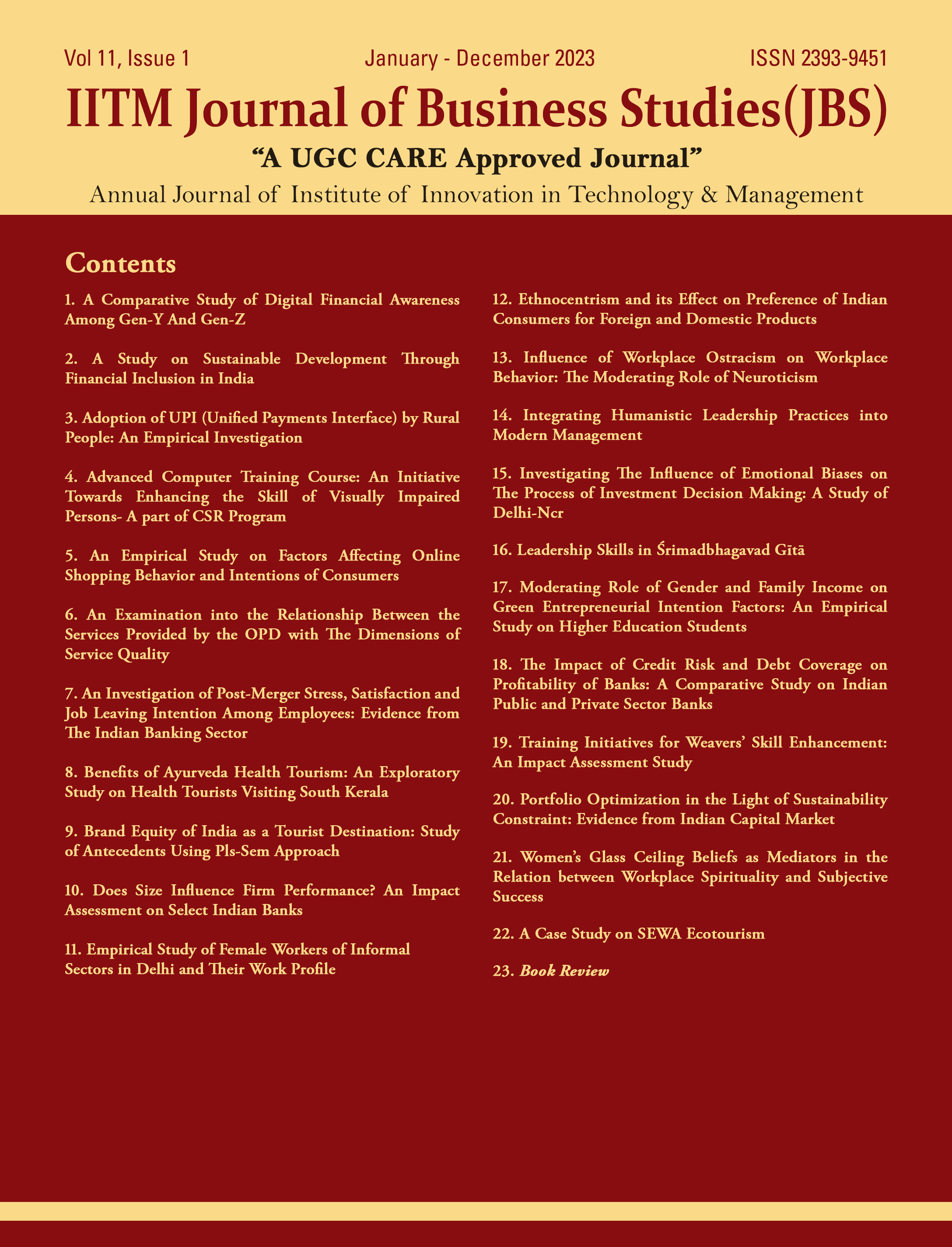IMPACT OF IND AS ADOPTION ON THE FINANCIAL PERFORMANCE OF INDIAN COMPANIES
DOI:
https://doi.org/10.48165/iitmjbs.2024.SI.13Keywords:
Ind AS, financial performance ratios, IFRS, t-testAbstract
The Indian companies are provided with a global reporting landscape with the introduction of Indian Accounting Standards (Ind AS). These standards are in line with the global International Financial Reporting Standards (IFRS) and have made the financial statements comparable at a global level. In India, the MCA gave a strategic plan for the introduction of Ind AS, which are in line with IFRS, in 2010. A planned roadmap was given for the adoption of Ind AS voluntarily from April 2015, mandatorily for all companies with a net worth of 500 crore or more from April 2016, and so on in a phased manner. The objective of the research is to analyze the impact of Ind AS adoption on the financial performance of selected companies in India, based on the cutoff year 2016. Data from 39 eligible companies (ranging from 2012-2023) was collected, and hypotheses were tested using paired sample t-tests. The results show that there is no significant impact of Ind AS adoption on the financial ratios of the selected companies. The study has practical implications for the companies that are still lagging behind in reporting Ind AS data and companies for whom adoption is still voluntary, as findings suggest that adoption and reporting of Ind AS do not affect the financial performance of the company.
References
1. AÇağlar, A., & Aktas, R. (2007). First Time Application of IFRS and Its Impact on Financial Ratios: A Study on Turkish Listed Firms. Problems and Perspectives in Management, 5(2), 99-123.
2. Aubert, F., Ferrer, E., & Grudnitski, G. (2011). The Impact and Importance of Mandatory Adoption of International Financial Reporting Standards in Europe. Journal of International Financial Management and Accounting, 22(1), 1-26.
(2011). The Effects of IFRS on Financial Ratios: Early Evidence in Canada. Certified General Accountants Association of Canada, 1-574.
4. Callao, S., Jarne, J. I., & Lainez, J. A. (2007). Adoption of IFRS in Spain: Effect on the comparability and relevance of financial reporting. Journal of International Accounting, Auditing and Taxation, 16, 148-178.
5. Dimitrios, B., Nikolaos, E., Konstantinos, P., & Dimitrios, V. (2013). The Impact of IFRS
on Ratios of Listed and New Listed Companies of Athens Exchange. International Journal of Business and Social Research, 3(5), 139-157. 6. Goodwin, J., Ahmed, K., & Heaney, R.
Review, 39(4), 290-302.Chandrasekar, V., & Kumar, D. N. S. (2016). Impact of IFRS adoption on financial decisions case study of Indian Information Technology Industry: Wipro Ltd.
(2007). The Effects of International Financial Reporting Standards on the Accounts and Accounting Quality of Australian Firms: A Retrospective Study [Working Paper]. The Hong Kong Polytechnic University.
7. Hung, M., & Subramanyam, K. R. (2007). Financial Statement Effects of Adopting International Accounting Standards: The Case of Germany. Review of Accounting Studies, 12(4), 623-657.
8. ICAI. (2018). Indian Accounting Standards (IFRS converged): Successful Implementation - Impact Analysis and Industry Experience [Report].
9. Pazarskis, M., Alexandrakis, A., Notopoulos, P., & Kydros, D. (2011). IFRS Adoption Effects in Greece: Evidence from the IT Sector. Management of International Business and Economics Systems.
10. Swaminathan, S. (2011). Financial Statement Effect on Convergence to IFRS: A Case study in India. International Journal of Multidisciplinary Research, 1(7), 317-336.
11. Tlemsani, I., Mohamed Hashim, M. A., & Matthews, R. (2024). The impact of IFRS adoption on Saudi Arabia. Journal of Islamic Accounting and Business Research, 15(3), 519-533. https://doi.org/10.1108/JIABR-11-
2022-0304
12. Sovbetov, Y. (2013). The Impacts of IFRS adoption on Key Financial Ratios in UK market – Over FTSE 100 Firms Through 2003-2007 years. Retrieved from http://www.
statistica.com.au/621913916.
13. Zeff, S. A. (2007). Some obstacles to global financial reporting comparability and convergence at a high level of quality. The British Accounting
Journal of Financial Management & Analysis, 29(2), 10+. Retrieved from link.gale.com/apps/ doc/ A503275157/AONE?u=anon~aabf98&sid =googleScholar&xid=8c643efb
14. Lantto, A., & Sahlstrom, P. (2009). Impact of IFRS Adoption on Key Financial Ratios. Accounting & Finance, 49(2), 341-361.
15. Arouri, M., Levy, A., & Nguyen, D. K. (2010). ROE and Value Creation under IAS/IFRS: Evidence of Discordance from French Firms. European Financial and Accounting Journal, 5(1), 84-112.
16. Ibiamke, N. A., & Ateboh Briggs, P. B. (2014). Financial Ratios Effect of International Financial Reporting Standards (IFRS) Adoption in Nigeria. International Journal of Business and Management Invention, 3(3), 50-59.
17. Agarwal, R. (2017). Impact Of Ind As On Financial Performance Of Energy Companies (A Comparative Study Of Selected Public And Private Sector Companies).
18. Abdul-Baki, Z., Uthman, A. B., & Sanni, M. (2014). Financial ratios as performance measure: A comparison of IFRS and Nigerian GAAP. Journal of Accounting & Management Information Systems/Contabilitate si Informatica de Gestiune, 13(1).
19. Ebaid, I. E.-S. (2022). IFRS adoption and accounting-based performance measures: evidence from an emerging capital market. Journal of Money and Business, 2(1), 94-106. doi:10.1108/JMB-11-2021-0057
20. Rudžionienė, K., Černiauskaitė, M., & Klimaitienė, R. (2022). The impact of IFRS adoption on companies’ financial ratios: evidence from Lithuania. Entrepreneurship and sustainability issues, 9(3), 212-226.

